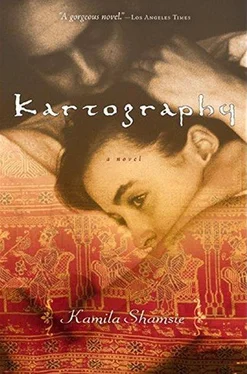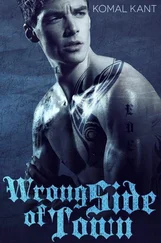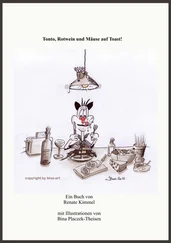Afterwards, I was to search my memory for any recollection of Zia’s reaction to that, but I can only remember him seeing me look around for somewhere to throw the tissue and pointing to a flowerbed.
In the car, on the way to Sonia’s we stopped at a traffic light where a man selling motia bracelets rapped on Zia’s window and said, ‘For pretty ladies.’ Zia had only enough change for one bracelet, which he offered to Sonia, but she said the smell of the flowers was too cloying, though she appreciated the gesture. I slipped on the bracelet and felt the little white buds cool against my wrist. I can’t recall if we drove to Sonia’s house in silence, which must mean we didn’t, but I know our conversation didn’t touch on her father’s situation or allude to the ordeal she had undergone. Round the corner from Sonia’s house, another motiawallah approached our car at a traffic light and held up a row of bracelets.
Zia rolled down his window. ‘No money. Besides, we’ve already bought. Raheen, show him.’
I held up my wrist.
The motiawallah turned to Sonia. ‘And yours?’
She shook her head. ‘I don’t have one.’
The motiawallah’s eyes widened. ‘You must take this from me,’ he said, slipping a bracelet off the wooden stick on which his wares were arrayed. ‘No, you must. I am your brother; as a brother I’m giving this to you. See, I have three sisters myself. I understand these matters.’ Here he gave Zia and Karim a look of disgust. ‘Please, I won’t sleep tonight if you don’t.’
‘That’s so typical,’ Sonia said, as Zia drove on. She had put the bracelet on and was leaning her cheek on her wrist, elbow propped on the window ledge, her nose almost buried in that cloying scent. ‘It’s so typical of our people. That generosity to strangers. I’m going to cry.’
She cried all the way to her house, tears mixing with flowers, the rest of us unsure what to do since she was in the front seat, which made it hard for Karim or me to put our arms around her. Zia signalled me frantically in the rear-view mirror. Should he pull over? And then what? Exchange positions with me so I could hug Sonia? Should he drive faster to get her quickly home, or slower to delay the inevitable knowledge that would greet her once she got there? I didn’t know. How should I know?
‘Just drive,’ Karim mouthed to Zia. So Zia drove and Sonia cried and I felt utterly ineffectual. But, more than that, I felt guilty, because I couldn’t stop thinking of how close Karim held Sonia at the airport and how beautiful she looked, even in pain, and now his hands were resting on her shoulders, and when she reached up to rest her hand on his I almost couldn’t breathe for jealousy. So I was glad when we finally approached the road to Sonia’s house; but when Zia turned the corner all four of us in the car were simply baffled — Sonia for reasons separate to ours — to see Sonia’s father getting into a police car. Before we could react, the car drove away. No fuss, no fanfare.
. . .
If we had more reliable systems of law and governance, perhaps our friendships would be shallower. But with no one to rely on except one another, Karachiites come together in times of crises with attitudes which suggest that no matter what else we are in our lives — bankers, teachers, hypochondriacs, cynics, Marxists, feudals, vegetarians, divorcees, bigamists, anorexics, dyslexics, sexists — our real vocation is friendship.
So by the time Sonia’s father was released by the first set of armed men, Sonia’s house was already filling up with people dropping by to see how everyone was and what they could do to help. And shortly after the second set took him away in the police car, all chairs, sofas and floor cushions were in use, and a dozen different conversations were being conducted on mobile phones by people calling ‘useful contacts’ to try to find out what was going on. All anyone knew was that the first round of men had started questioning Sonia’s father about his business affairs, when they were interrupted by a phone call, which involved a lot of ‘yessirs’ on the part of one of the interrogators, followed by a stream of curses when he hung up. Clearly, everyone surmised, two different agencies were after Sonia’s father, and the first had been instructed by someone in a position of high authority to release their captive so that the other agency could deal with him.
I looked over at Sonia. She was sitting on the sofa in the downstairs study, our friend Nadia sitting to one side of her, clasping her hand, and Karim perched on the sofa arm on the other side of her, his hand on her shoulder. The room was filled with the hum of our friends talking, keeping the conversation light when Sonia seemed to need that, and discussing all the cases of people wrongfully arrested and soon released, when it seemed that would do her more good. Zia hovered in the doorway, trying to get in touch with his father, but every time he managed to get through to the Club — a difficult feat just days before the Winter Ball — and asked for the call to be transferred to his father he was put through to the bakery instead.
‘God, Karim’s looking gorgeous,’ one of my friends whispered to me.
‘Normally, we’d flip a coin and one of us would grab him,’ her twin sister said. ‘But you’ve got right of first refusal.’
‘This is hardly the time,’ I hissed back, and they exchanged meaningful looks and subsided.
I saw the front door open and more of Sohail’s friends walked in, followed by one of Sonia’s mother’s cronies. That’s when it struck me: none of Sonia’s father’s friends were here. In households like mine, and Nadia’s and the twins’ and — to some extent — Zia’s, and — once upon a time — Karim’s, there were no set boundaries between our mothers’ friends and our fathers’ friends. But Sonia’s parents lived entirely separate lives, with Sonia and Sohail serving as the only links between them. So where now were Bunty and his cohorts, who for years had been spending their Friday nights drinking Sonia’s father’s whisky out of Sonia’s father’s glasses in Sonia’s father’s living room? I could picture them now, sitting back in their exaggeratedly regal postures, taking bets on whether he’d go to prison or not. And if he didn’t, if he made it through this, they’d say ,yaar, of course we weren’t at your house that day, mate; we were running all over town trying to find out what had happened to you. Pass the Black Label. Well, that’s what you get for trying to ingratiate yourself with high society on the sole basis of money so new the ink on it is barely dry.
I sunk my face into my hands. Why did I have to think this way? My palms smelt like steel. I didn’t know why. There I’d been searching for specific reasons why Karim was so angry with me, and maybe it was just this: because he knew me. Maybe that was reason enough for disgust.
‘Raheen?’
I looked up at Sonia. ‘Are you OK?’ she said.
Images flashed through my mind. Sonia watching her father accused of drug smuggling in court; Sonia hearing the verdict of ‘guilty’; Sonia visiting her father in prison; Sonia sifting through the evidence and discovering it’s all true; Sonia trying to find a way to still be herself, still be compassionate, forgiving, generous, when looking her father in the eye, knowing the truth of who he is. Then I saw Karim’s hand, still resting on her shoulder, and I knew he would stand by her every moment she needed him. I thought, Please, let the charges he dropped, and I didn’t know if I wanted it for Sonia’s sake or for my own.
I lifted myself off the floor cushion. ‘I’m fine. I just need some water.’ I edged towards the door. Karim pointed at the jug of water and glasses on the trolley next to him, but I pretended to look distracted and turned away.
Читать дальше












